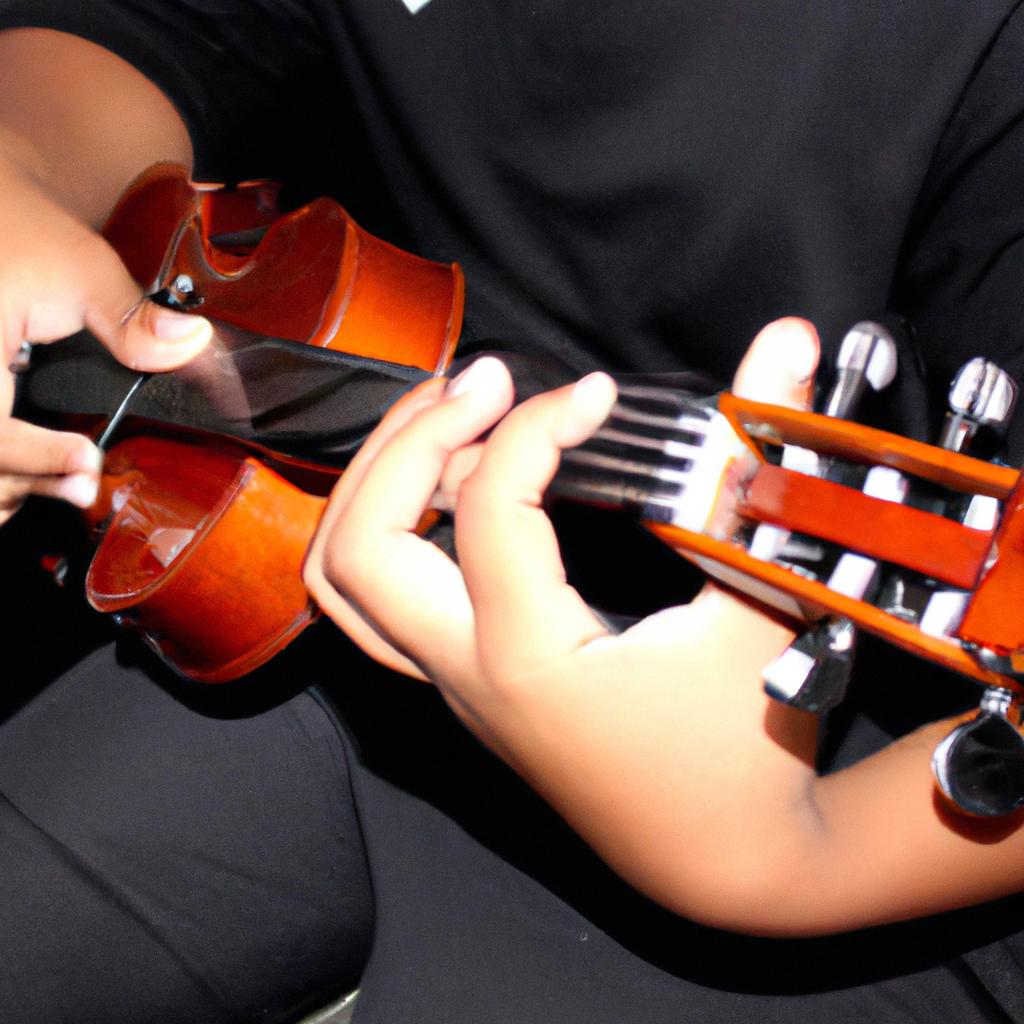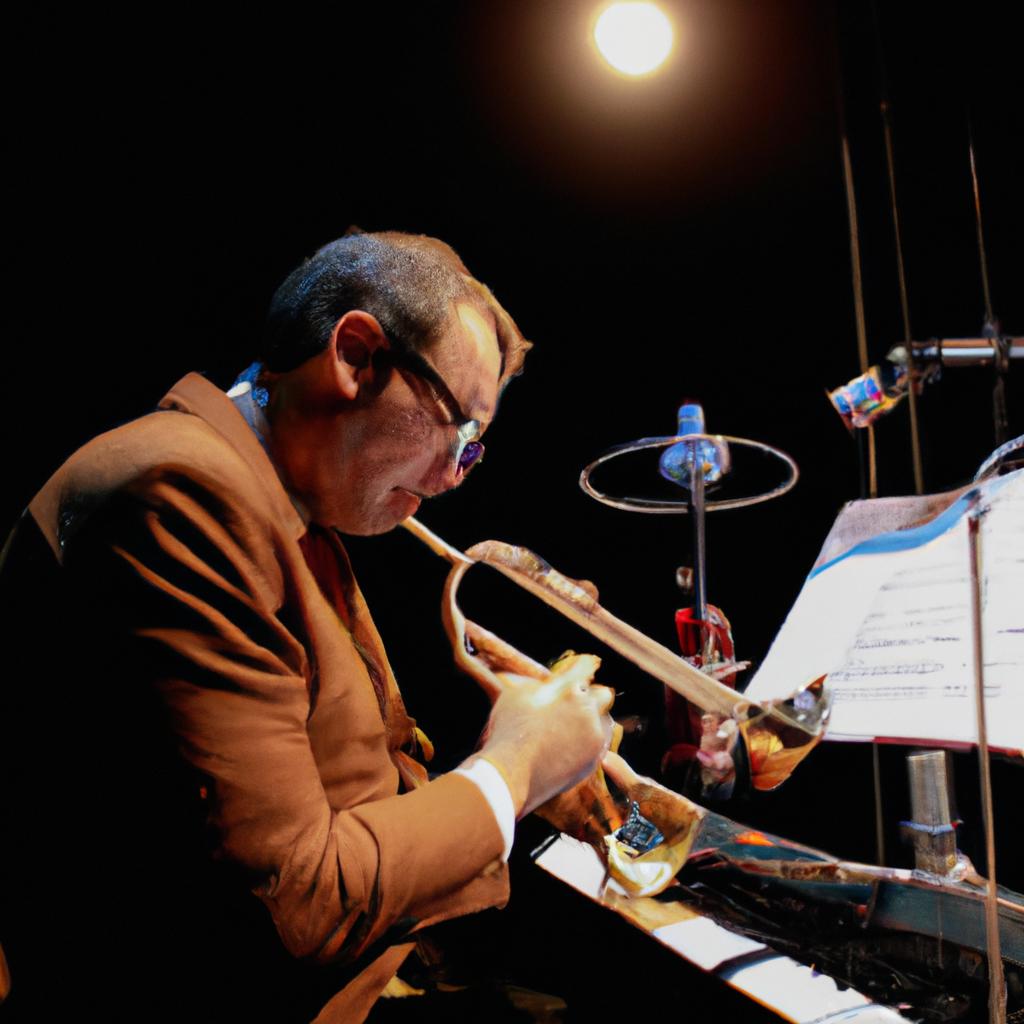Expert musicians are known for their exceptional skill levels, which set them apart from amateur and intermediate players. These highly trained individuals possess a deep understanding of music theory, technical proficiency on their instruments, and the ability to interpret and express emotions through their performance. For instance, let us consider the case of renowned pianist Anna Johnson. With over 30 years of experience and numerous accolades under her belt, she exemplifies the expertise that can be achieved through dedication and practice.
To attain expert status in music, one must first acquire a comprehensive knowledge of music theory. This theoretical foundation serves as a framework for understanding musical concepts such as harmony, rhythm, melody, and form. Expert musicians are able to analyze complex compositions, identify key signatures and chord progressions effortlessly, and make informed decisions about interpretation during performances. Their mastery of these fundamental principles allows them to navigate intricate musical passages with ease and precision.
In addition to theoretical knowledge, expert musicians exhibit remarkable technical proficiency on their chosen instrument(s). They spend countless hours practicing scales, arpeggios, finger exercises, and challenging repertoire pieces to develop dexterity and control. Through this rigorous training regimen, they refine their technique to achieve flawless execution even at high tempos or demanding musical passages. The combination of the combination of technical skill and musicality allows expert musicians like Anna Johnson to effortlessly navigate the most challenging pieces with virtuosity and expressiveness.
Furthermore, expert musicians possess a deep understanding of musical interpretation. They are able to bring out the nuances and emotions embedded within a composition, allowing them to connect with their audience on a profound level. Through careful study and analysis of the score, they make deliberate choices in dynamics, phrasing, and articulation to convey the composer’s intentions. This ability to communicate through music is what sets expert musicians apart from others, as they can evoke powerful emotions and create captivating performances.
Becoming an expert musician requires dedication, discipline, and a lifelong commitment to learning and growing as a musician. It involves regular practice sessions, continued education in music theory and performance techniques, as well as exposure to diverse repertoire. Expert musicians often seek guidance from experienced mentors or teachers who can provide valuable insights and feedback on their progress.
In conclusion, expert musicians distinguish themselves through their exceptional skill levels derived from their comprehensive knowledge of music theory, technical proficiency on their instruments, and their ability to interpret and express emotions through their performance. Their dedication to honing their craft allows them to achieve mastery that sets them apart from amateur or intermediate players.
Beginner
Expert Musicians: The Skill Levels
Beginner
When embarking on a musical journey, many aspiring musicians start at the beginner level. At this stage, individuals are new to their chosen instrument and have limited knowledge and experience in playing music. To illustrate, let’s consider a hypothetical scenario of someone learning how to play the guitar for the first time.
In this initial phase, beginners often face challenges such as understanding basic music theory concepts, developing finger dexterity and coordination, and familiarizing themselves with the instrument’s anatomy. These obstacles can be overcome through consistent practice and dedication. It is important to note that progress may vary among individuals due to factors such as natural aptitude or prior exposure to music.
- Frustration when initially unable to produce desired sounds
- Overwhelm caused by unfamiliarity with musical notation
- Self-doubt arising from comparing oneself to more experienced musicians
- Excitement mixed with anxiety before performing in front of others
Furthermore, we can represent the emotions experienced by beginner musicians through a table:
| Emotion | Description |
|---|---|
| Frustration | Feeling discouraged when struggling with technique |
| Overwhelm | Experiencing difficulty understanding complex theory |
| Self-doubt | Comparing one’s abilities unfavorably against peers |
| Excitement | Eager anticipation coupled with nervousness |
As beginners gradually develop their skills, they become more confident in their ability to play simple melodies and chords. With perseverance and guidance from instructors or resources like online tutorials, these individuals begin building a solid foundation necessary for progressing towards intermediate levels.
Transitioning into the subsequent section about “Intermediate,” it becomes evident that once beginners gain proficiency in fundamental techniques and concepts, they will embark upon further challenges in their musical journey.
Intermediate
From the early stages of learning a musical instrument, individuals progress to develop their skills and move into the intermediate level. At this stage, musicians begin to demonstrate a greater understanding of music theory and proficiency in technique. To illustrate, let us consider a hypothetical scenario involving an intermediate guitarist named Alex.
Alex has been playing guitar for two years now and has successfully mastered the basic chords and strumming techniques. In addition to his repertoire of songs, he has started exploring more complex fingerpicking patterns and experimenting with different genres such as blues and jazz. While still refining his technique, Alex can comfortably perform at small gatherings or open mic nights.
Transitioning from beginner to intermediate entails significant growth in various aspects of musicianship. Here are some key characteristics that distinguish intermediate musicians:
-
Expanded Repertoire:
- They have developed a diverse collection of pieces they can proficiently play.
- They are familiar with different styles within their chosen genre(s).
- They may even start composing their own music or improvising during performances.
-
Enhanced Technique:
- Their technical skills have improved significantly since their beginner days.
- They possess better control over dynamics, tone quality, and articulation.
- They’re able to execute more advanced playing techniques like hammer-ons, pull-offs, bends, or vibrato.
-
Deeper Musical Understanding:
- They grasp fundamental concepts of music theory such as scales, modes, chord progressions.
- They understand how harmony works and can analyze simple compositions.
- They exhibit a heightened sense of rhythm and timing.
Table showcasing notable differences between beginners and intermediates:
| Beginners | Intermediates | |
|---|---|---|
| Skills | Basic | Proficient |
| Rep | Limited | Diverse |
| Theory | Limited | Expanded |
| Technique | Developing | Enhanced |
In the intermediate phase, musicians continue to refine their skills and explore new musical horizons. They may join bands or ensembles to gain valuable experience collaborating with other musicians. The journey from beginner to intermediate marks a significant milestone and sets the stage for further growth as they move into the advanced level of expertise.
Transitioning to the subsequent section about “Advanced,” musicians at this level face even greater challenges in expanding their technical prowess and deepening their understanding of music theory.
Advanced
Expert Musicians: The Skill Levels
Transitioning from the intermediate level to advanced musicianship requires a significant leap in skill and dedication. While intermediate musicians have developed a solid foundation, advanced musicians possess a heightened level of proficiency that allows them to explore complex musical concepts with ease. To illustrate this progression, let us consider the hypothetical case study of Emily, an aspiring pianist who has recently transitioned into the advanced skill level.
Emily’s journey towards becoming an advanced musician involved several key aspects:
-
Technical Mastery: At the advanced level, musicians like Emily display exceptional technical control over their instruments. Their fingers effortlessly glide across keys or strings, producing precise and nuanced sounds. In Emily’s case, she dedicated countless hours to perfecting her technique through daily finger exercises and scales. This meticulous attention paid off as her playing became more fluid and expressive.
-
Musical Interpretation: Advanced musicians possess a deep understanding of musical interpretation, breathing life into each note they play. They are capable of dissecting intricate compositions and conveying the composer’s intended emotions through their performance. For instance, when Emily tackled Beethoven’s “Moonlight Sonata,” she delved into its complexities, capturing both its melancholic nature and moments of serene beauty.
-
Collaborative Skills: Advancing to this level also entails honing one’s ability to collaborate effectively with other musicians. Advanced musicians demonstrate exceptional listening skills and adaptability while performing in ensembles or orchestras. Emily actively sought out opportunities to perform with fellow instrumentalists, allowing her to sharpen her collaborative abilities and create harmonious music together.
-
Performance Confidence: Lastly, being an expert musician involves having unwavering confidence on stage. Advanced musicians like Emily exude poise during performances, captivating audiences with their commanding presence and engaging stage presence. Through years of practice and exposure to various live settings such as recitals and competitions, they cultivate a sense of assurance that enhances their overall musicality.
Emotional Bullets:
- Witnessing the seamless coordination between advanced musicians in an ensemble can evoke a sense of awe and admiration.
- Experiencing the emotional depth conveyed by an advanced musician’s interpretation of a complex composition can leave listeners moved and inspired.
- Observing the astonishing technical prowess displayed by expert musicians during virtuosic passages can create feelings of amazement and wonder.
- Attending a live performance where an advanced musician exudes confidence on stage can generate excitement and anticipation among the audience.
| Aspects | Description |
|---|---|
| Technical Mastery | Exceptional control over instrument, effortless technique |
| Musical Interpretation | Deep understanding of compositions, conveying intended emotions |
| Collaborative Skills | Effective collaboration with other musicians, adaptability |
| Performance Confidence | Unwavering confidence on stage, captivating presence |
As Emily continues to thrive as an advanced musician, she sets her sights on reaching the pinnacle of musical mastery: becoming a master. This next phase will demand even greater dedication and refinement as she strives to attain unparalleled expertise in her craft. The path towards mastering music beckons, promising new challenges for those who dare to pursue it wholeheartedly.
Master
Expert Musicians: The Skill Levels
In the previous section, we explored the advanced level of musicianship, where musicians have honed their skills and demonstrated a high level of proficiency. Now, let us delve into the next tier of expertise – mastery.
Imagine a scenario where an accomplished pianist effortlessly performs a complex composition by Chopin at a concert hall. The audience is captivated by the musician’s flawless technique, interpretation, and ability to convey emotions through each note played. This exemplifies the pinnacle of musical artistry known as master-level musicianship.
To better understand this level of skill, consider these key characteristics:
-
Technical Proficiency:
- Mastery of instrument-specific techniques.
- Ability to perform challenging pieces with precision.
- Effortless execution of intricate passages and virtuosic displays.
-
Musical Interpretation:
- Deep understanding and insight into musical compositions.
- Creation of unique artistic interpretations that evoke emotional responses from listeners.
- Skillful use of dynamics, phrasing, and timing to enhance performances.
-
Creative Expression:
- Improvisational abilities that allow for spontaneous musical creation.
- Incorporation of personal style and individuality in performances.
- Pushing boundaries by experimenting with various genres or fusion styles.
-
Collaborative Skills:
- Seamless coordination with other musicians in ensemble settings.
- Adaptability to different musical contexts and genres.
- An ability to lead or follow when collaborating with others.
In summary, mastering an instrument involves reaching new heights in technical proficiency while also delving deeper into music interpretation and creative expression. It requires years of dedicated practice, unwavering commitment, and continuous growth as a musician.
Transitioning now to our next section on prodigies, we will explore individuals who possess extraordinary talent from an early age – demonstrating exceptional aptitude beyond what one might expect at their developmental stage.
Prodigy
Expert Musicians: The Skill Levels
Mastering an instrument requires years of dedicated practice and a deep understanding of musical theory. In the previous section, we explored musicians at the pinnacle of their craft – the Masters. Now, let’s turn our attention to another remarkable group known as Prodigies.
Imagine a young pianist who effortlessly performs complex compositions with astonishing precision and maturity. This hypothetical prodigy demonstrates exceptional talent from an early age, captivating audiences worldwide with their virtuosic performances. Often recognized by renowned music institutions, they are sometimes granted scholarships or mentorships to nurture their extraordinary abilities.
To further understand the skill levels of expert musicians, consider these emotional responses often evoked when witnessing their performances:
- Awe: The sheer mastery displayed by these musicians can leave listeners in awe, amazed by their technical prowess and ability to convey emotion through sound.
- Inspiration: Witnessing such incredible talent can inspire aspiring musicians to push themselves further, knowing that greatness is attainable through dedication and hard work.
- Enthusiasm: Expert musicians have a unique ability to ignite enthusiasm within audiences, sparking a passion for music even among those not typically drawn to it.
- Elation: The joy experienced while listening to a truly gifted musician can create moments of pure elation, where time seems to stand still and nothing else matters except being immersed in the music.
Let us now delve into a table comparing key characteristics between Masters and Prodigies:
| Masters | Prodigies | |
|---|---|---|
| Age | Typically older | Usually younger |
| Training | Extensive experience | Exceptional natural talent |
| Repertoire | Vast range | Focused on specific genres |
| Musical Growth | Continuous refinement | Rapid development |
As we move forward in this exploration of expert musicianship, we will now shift our focus to yet another level of skill – the Virtuosos. These individuals possess an unparalleled level of technical proficiency, pushing the boundaries of what is thought possible on their chosen instrument.
In this next section, we will examine the characteristics and achievements that define these exceptional musicians, shedding light on their extraordinary abilities and contributions to the world of music.
Virtuoso
Expert Musicians: The Skill Levels
Transitioning from the previous section on prodigies, we now explore the skill level of virtuosos. These highly accomplished musicians have dedicated countless hours to their craft and possess an exceptional mastery of their instrument or voice. To illustrate this point, let us consider the hypothetical case study of Emma, a young violinist who has honed her skills through years of disciplined practice.
Emma began playing the violin at the age of five and quickly showed extraordinary talent. Her dedication and passion for music led her to pursue intensive training under renowned instructors. By adolescence, she had already won numerous national competitions and performed with prestigious orchestras around the world. Emma’s technical proficiency allowed her to effortlessly execute complex passages with precision while infusing each note with emotional depth and expression.
To truly understand the remarkable abilities of virtuosos like Emma, it is important to delve into the defining characteristics that set them apart:
- Technical prowess: Virtuosos exhibit unparalleled technical skills, seamlessly executing intricate musical passages that require advanced finger dexterity and bow control.
- Interpretative excellence: Their profound understanding of musical composition allows virtuosos to convey nuanced emotions through their performance, captivating audiences with their artistic interpretations.
- Musical versatility: They are adept at performing across different genres and styles, showcasing adaptability in tackling diverse repertoire ranging from classical compositions to contemporary pieces.
- Stage presence: Virtuosos exude confidence when performing live, engaging listeners not only through their impeccable technique but also through their charismatic stage presence.
The following table highlights key distinctions between prodigies and virtuosos in terms of skill development:
| Prodigy | Virtuoso | |
|---|---|---|
| Age | Early childhood | Years of intense practice |
| Natural Talent | Inborn aptitude | Nurtured talents |
| Rapid Progress | Swift advancement | Steady growth |
| Sustained Skill | May plateau or decline | Consistent excellence |
This juxtaposition emphasizes the significance of dedicated practice and continuous refinement in elevating musical expertise. While prodigies showcase exceptional abilities at an early age, virtuosos demonstrate sustained mastery through years of diligent training.
Ultimately, the realm of expert musicians encompasses a spectrum of skill levels, from prodigies who astound with their innate talent to virtuosos who mesmerize audiences with their refined technique and artistic sensibility. By understanding the attributes that define each level, we gain insight into the dedication required to achieve extraordinary musical proficiency.
 Mikey Dee
Mikey Dee



